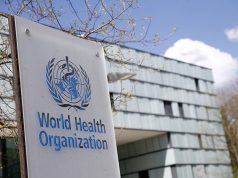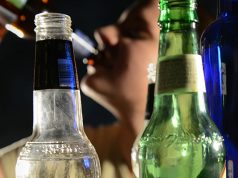Many people enjoy a tipple over the festive season, but overdoing it could cause “holiday heart syndrome”, a condition where the heart beats abnormally – known as atrial fibrillation or AF. This is often experienced as a fluttering in the chest. If it continues for a while and is left untreated, it could lead to a heart attack.
The term holiday heart syndrome was first coined in 1978 and is mainly used by doctors in the US. Outside the US, it goes by the slightly less snappy name: alcohol-induced atrial arrhythmia.
Scientists can’t be sure how common the condition is, mainly because many people who experience an abnormal heartbeat after drinking alcohol may not seek medical attention. However, a Finnish study, published in 1987, reported that 5%-10% of new cases of AF were caused by excess alcohol consumption.
AF is rare in people under 30, and isolated episodes of it in the young are often attributed to endurance exercise, recreational drug use and obesity. However, the most common cause is binge drinking.
The Copenhagen City Heart Study identified over 1,000 cases of AF among 16,500 men and women. Heavy alcohol use was responsible for 5% of AF cases in men. And the risk of developing AF was found to be 1.5 times higher in binge drinkers compared with those who drank moderate amounts of alcohol or no alcohol at all.
Why drinking alcohol is related to the development of arrhythmia is unclear. There may be a direct toxic effect of alcohol on the cells of the heart muscle or indirect toxic effects from breakdown products (metabolites) either on the heart itself or other organs, such as the endocrine adrenal glands, which are located on the top of each kidney.
Several mechanisms might explain it. First, alcohol interferes with the nerve conduction in the heart, altering the rate of nerve signal transmission across the heart muscle. Second, alcohol can increase the release of adrenaline from either the adrenal glands or the heart tissue, which can change the heartbeat leading to arrhythmia. Third, fatty acids in the blood increase following alcohol consumption and are thought to be associated with the development of AF. Lastly, the alcohol metabolite acetaldehyde can increase the rate of abnormal muscle contraction).
Unanswered questions
Although scientists have established that excessive alcohol consumption is bad for the heart, some questions remain unanswered. First, we don’t know if the rate of holiday heart syndrome is different in long-term drinkers compared with non-drinkers. Chronic alcohol use is associated with a particular heart problem known as alcoholic cardiomyopathy. This is where the heart walls become stretched, thickened or stiff, changing the heart’s ability to pump enough blood around the body. There could be an added risk of holiday heart syndrome if daily alcohol users binge drink.
Second, there is a lack of information on other cardiac risk factors (comorbidities) and their influence on the risk of developing holiday heart syndrome. Genetic factors, type of alcoholic drink (amount of alcohol per unit), speed of consumption and if consumption takes place during fasting or after a meal may all influence the development of AF and holiday heart syndrome. There is, however, one saving grace, in that quitting alcohol reverses the AF-causing effects, and in those with no underlying heart conditions, it seems to have no long-term damaging effect.
A great deal has been investigated relating to alcohol and its effect on the heart, however, much of the published research has focused on moderate intake of alcohol and its ability to protect the heart. Since holiday heart syndrome was first coined over 40 years ago, the public and doctors must be both aware of the toxic effects of alcohol on the heart, especially in those who do not show signs of classical heart diseases.
While the season upon us is to enjoy goodwill and be merry, maybe we should think twice this holiday period before we reach for yet another glass of mulled wine or eggnog.![]()
David C Gaze, Senior Lecturer in Chemical Pathology, University of Westminster. This article is republished from The Conversation under a Creative Commons license. Read the original article.










